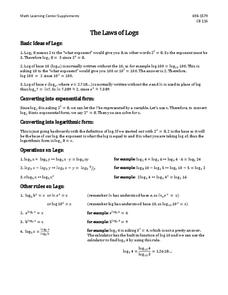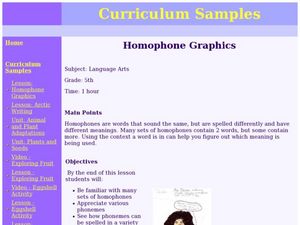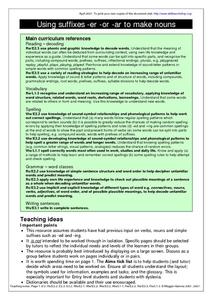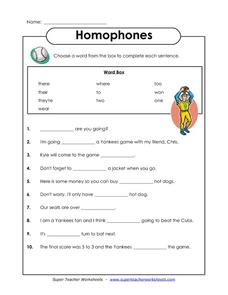Curated OER
Genetics and the Work of Mendel
Excellent examples and clear diagrams in this PowerPoint will help you explain the genetics of alleles and the combinations of hybrid crosses. A high school class would appreciate having this student copy of the PowerPoint as the images...
Curated OER
Understanding Points of View
Investigate the importance of author's point of view. Young linguists study primary source documents related to the Treaty of Casco Bay. The first source is authored by the Native American Chiefs, the second by an English...
Curated OER
Ir+a+the Infinitive Form of the Verb
With the ir verb, meaning to go, Spanish speakers can also say "I am going to..." Complete two quick exercises to show them the different use ir can have.
Curated OER
Identifying Linear Functions from Graphs
Keep your mathematicians engaged using this group linear functions activity. Each of ten groups receives two graphs with both an image and equation, as well as a "who has" phrase to call out the next graph. Scholars stay on their toes as...
Curated OER
Fact vs. Opinion: Theory, Hypothesis, and Bias
Emphasize the differences between a theory and a hypothesis to teach your class how to avoid scientific bias.
Curated OER
Create a Magic Lantern Show; Freed People in the Reconstruction South
Engage your scholars by having them create "magic lantern shows" inspired by the film Dr. Toer's Amazing Magic Lantern Show: A Different View of Emancipation. As they study the South's Reconstruction through primary sources, learners...
Curated OER
Family Life
What is family? Challenge your scholars to write an encompassing definition of what this word means to them. After reading "It May Be a Family Matter, But Just Try to Define Family," class members discuss the emotional issues surrounding...
Del Mar College
The Laws of Logs
Two students were sitting on a log and decided they wanted to be awesome at math. Bring in the logarithm handout! The first page introduces the idea of a logarithm and the different operations and rules it entails. The second page...
Curated OER
Rhythm and Improv, Jazz and Poetry
Connect the ideas of jazz improvisation and art to writing poetry. Learners collaborate and write different lines of poetry, imitating the jazz styles of improvisation and freewriting. Take a close look at the poems "Tenebrae" by Yusef...
Curated OER
Bloom's Taxonomy for Ethan Frome: Chapter Four
As your class progresses through Chapter four of Ethan Frome, provide them with these thought-provoking questions built using Bloom's Taxonomy.
Facing History and Ourselves
What Does It Mean to Belong?
After reading and analyzing The 'In' Group by Eve Shalen, sixth graders consider how the categorization of people results in exclusion, discrimination, and injustice.
Desert Discoveries
Invent - A - Saurus
Fourth graders get to invent their own dinosaur! This is done by using a very clever worksheet embedded in the plan. The worksheet leads them through naming their dinosaur by having explanations of the Latin terminology that is used with...
Curated OER
Alcoholic Fermentation in Yeast
Biology classes will bubble with excitement as they complete this assignment. Beginning with an informative overview of cellular respiration and fermentation processes, the highlight comes as an experiment in determining the rate of...
Curated OER
Homophones Activities 1-5
In this language arts activity, students discover that homophones are words that sound alike. Students complete 5 activities with homophones: matching words to pictures, completing sentences, explaining differences between words and...
Curated OER
Telling Stories Through Dance
Examine the movement of characters in the story, Caps for Sale. Using the text, pupils invent gestures and movements for some of the actions and major events. They practice retelling a story by using the movements they developed. They...
Curated OER
Autosomal Pedigrees Worksheet
Three autosomal pedigrees are printed on this assignment. Biology scholars read them and determine the phenotypes for several individuals and find which ones inherit different genetic disorders. This fundamental skill can be reinforced...
Curated OER
Right Triangles
In this right triangles worksheet, students solve and complete 2 different types of problems. First, they take the case of an isosceles right triangle with a given leg and hypotenuse. Then, students find the sum of the squares of the...
Curated OER
Homophone Graphics
Fifth graders create homophones in a group and share them with the class. In this language arts lesson, 5th graders draw a homophone set. Additionally, students create a sentence using the homophone.
Curated OER
Exaggerated Poetry
Students use physical poses and vocal choices to create emphasis in communication. In this exaggerated Poetry lesson, students use physical movement and vocal choices to exaggerate an expression make a connection between literary content...
Curated OER
Using Suffixes -er, -or, -ar To Make Nouns
In these grammar worksheets, students will circle nouns and verbs, fill in blanks with suitable verbs, add -er and -or to verbs to create nouns, write silly sentences using nouns that end in -ar, add the correct suffix to change verbs...
Curated OER
Homophones
In this homophones worksheet, students underline the incorrect word in each sentence while providing the correct homophone that goes in its place. Students complete 15 sentences.
Curated OER
Finding Area
Fourth graders explore how to find the area of a rectangular object. As a class, they discuss definition of area and strategies for finding area. The teacher models finding the area of an object by counting squares. Students observe...
Curated OER
Choose the Correct Homophone II
Homophones are tough! Identify different homophones and how they're different. Common ones like son and sun and plain and plane are included. Some uncommon ones are also included, like bridal and bridle.
American Museum of Natural History
Trip Up Your Brain
Sometimes different parts of the brain disagree. See what this disagreement looks like using a remote learning resource to experience how brains often take shortcuts. Pupils complete the activity, observe their results, and then read...

























